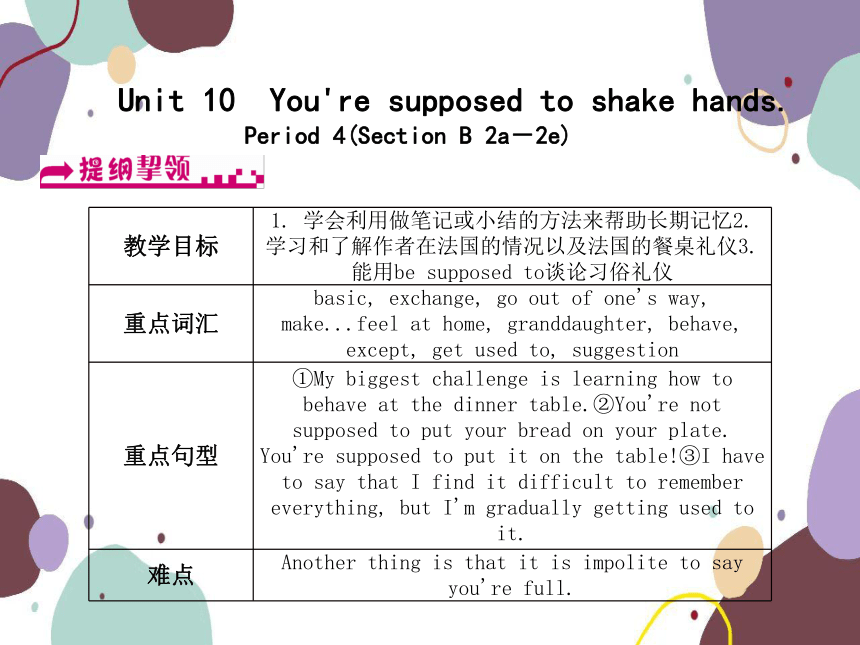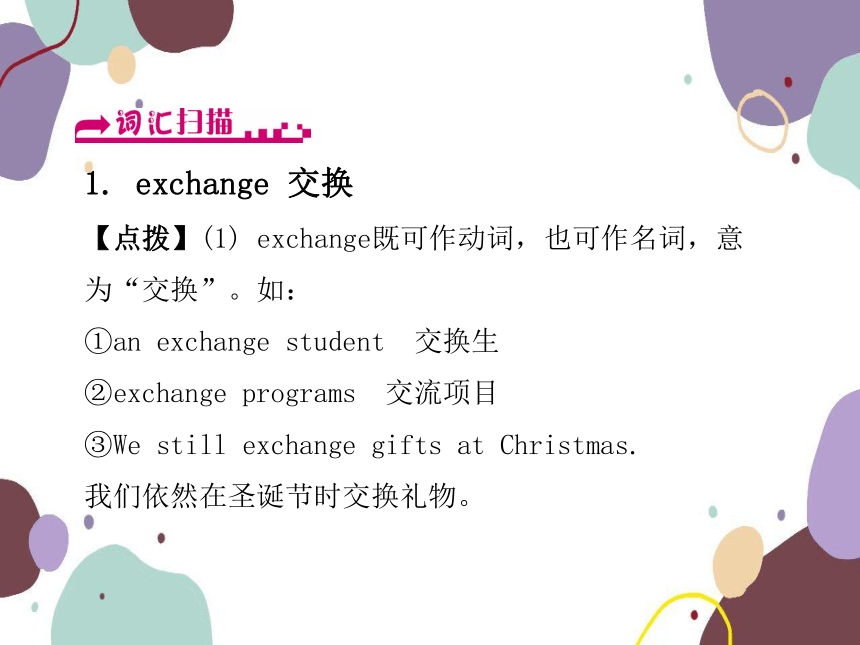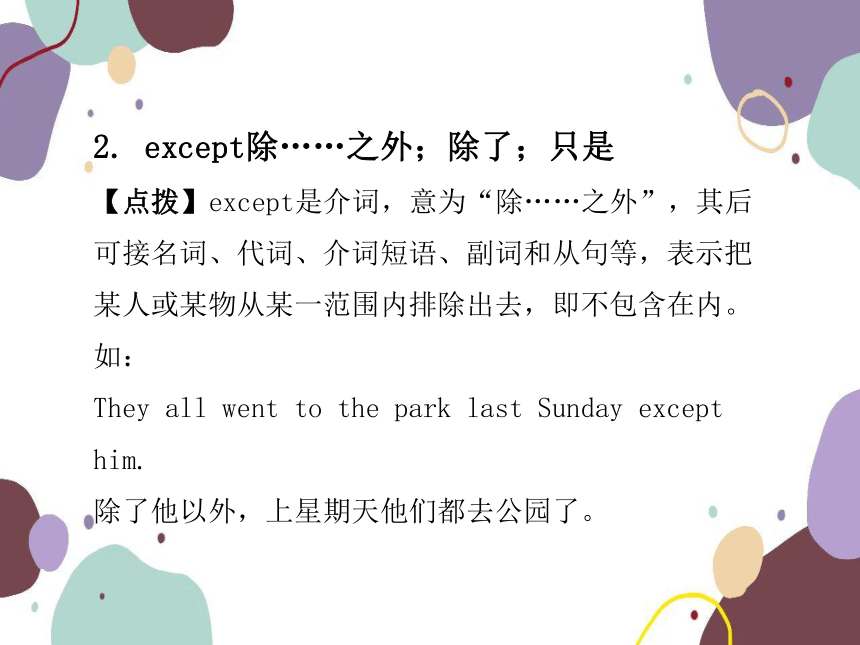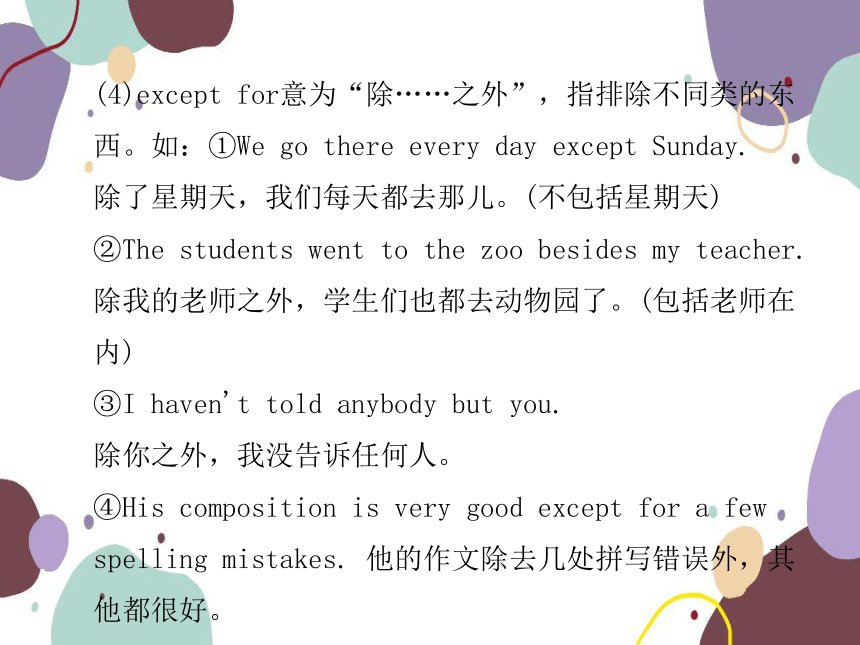人教版九年级全册Unit 10You're supposed to shake hands.(Section B 2a-2e)知识点课件(共18张PPT)
文档属性
| 名称 | 人教版九年级全册Unit 10You're supposed to shake hands.(Section B 2a-2e)知识点课件(共18张PPT) |  | |
| 格式 | pptx | ||
| 文件大小 | 235.6KB | ||
| 资源类型 | 教案 | ||
| 版本资源 | 人教新目标(Go for it)版 | ||
| 科目 | 英语 | ||
| 更新时间 | 2022-10-19 09:17:48 | ||
图片预览







文档简介
(共18张PPT)
Unit 10 You're supposed to shake hands.
Period 4(Section B 2a-2e)
教学目标 1. 学会利用做笔记或小结的方法来帮助长期记忆2. 学习和了解作者在法国的情况以及法国的餐桌礼仪3. 能用be supposed to谈论习俗礼仪
重点词汇 basic, exchange, go out of one's way, make...feel at home, granddaughter, behave, except, get used to, suggestion
重点句型 ①My biggest challenge is learning how to behave at the dinner table.②You're not supposed to put your bread on your plate. You're supposed to put it on the table!③I have to say that I find it difficult to remember everything, but I'm gradually getting used to it.
难点 Another thing is that it is impolite to say you're full.
1. exchange 交换
【点拨】(1) exchange既可作动词,也可作名词,意为“交换”。如:
①an exchange student 交换生
②exchange programs 交流项目
③We still exchange gifts at Christmas.
我们依然在圣诞节时交换礼物。
(2)exchange的常用搭配:exchange... for...意为“用……交换……”。如:
①exchange dollars for RMB 美元换人民币
②I'd like to exchange this dress for one in a smaller size.
我想把这条连衣裙换小一个尺码。
2. except除……之外;除了;只是
【点拨】except是介词,意为“除……之外”,其后可接名词、代词、介词短语、副词和从句等,表示把某人或某物从某一范围内排除出去,即不包含在内。如:
They all went to the park last Sunday except him.
除了他以外,上星期天他们都去公园了。
【辨析】except, besides, but与except for
(1)except意为“除……之外(不再有)”,强调被排除的部分不包括在内。
(2)besides意为“除……之外(另外还有)”,强调被排除的部分也包括在内。
(3)but意为“除了……”,与except同义,通常用于all, every, who, nothing, nobody等词之后。
(4)except for意为“除……之外”,指排除不同类的东西。如:①We go there every day except Sunday.
除了星期天,我们每天都去那儿。(不包括星期天)
②The students went to the zoo besides my teacher.除我的老师之外,学生们也都去动物园了。(包括老师在内)
③I haven't told anybody but you.
除你之外,我没告诉任何人。
④His composition is very good except for a few spelling mistakes. 他的作文除去几处拼写错误外,其他都很好。
1. I was a bit nervous before I arrived here, but there was no reason to be.在我到达之前我有点紧张,但是没有理由紧张啊。
【点拨】no reason to do sth. 表示“没有理由做某事”。如:
①Tony has no reason to say so.
托尼没有理由这样说。
②There is no reason to be late.
没有理由迟到。
2. They go out of their way to make me feel at home.
他们尽力使我感到宾至如归。
【点拨】(1)go out of one's way意为“特地;格外努力”。如:
①They went out of their way to help her.
他们竭力帮助她。
②He went out of his way to teach me to learn English well. 他尽力教我学好英语。
(2)make... feel at home意为“使(某人)感到宾至如归”。如:
His kindness makes me feel at home.
他的友好使我感到宾至如归。
【延伸】make的其他用法:
(1)make sth. for sb.=make sb. sth.,意为“为某人制作某物”。如:
She made a dress for me.=She made me a dress. 她给我做了一条连衣裙。
(2)make还可表示“使处于某种状态;使成为”,后接名词、形容词或过去分词作宾语补足语。
如:
The news made me disappointed.
这个消息使我大失所望。
(3)make sb. do sth.使某人做某事。如:
He made me repeat it.
他让我把这件事复述一遍。
3. As you can imagine, things are very different from the way they are at home.
就像你可以想象到的那样,这和我们在家里确实不一样。
【点拨】(1)as引导非限制性定语从句,指代整个主句的内容,意为“正如;如同”。
(2)imagine是动词,意为“想象”,其后可加名词、动名词和that/what从句。如:
①You can imagine the situation there.
你可以想象那里的情况。
②I can hardly imagine swimming in winter.
我几乎不能想象在冬天游泳。
③I can't imagine what he looks like.
我想象不出他是什么长相。
④I can't imagine that he will come to our school tomorrow. 我不能想象明天他会来我们学校。
4. I have to say that I find it difficult to remember everything, but I'm gradually getting used to it. I don't find French customs so strange anymore.
我不得不说我发现想要记住一切是很困难的,但我渐渐习惯了,并且发现法国的风俗习惯也不再那么奇怪了。
【点拨】(1)主语+find+it+adj.+to do sth.为常用句型,意为“某人发现做某事是……的”,其中it为形式宾语,adj.为宾语补足语,动词不定式是真正的宾语。可以接复合宾语的动词还有feel, think, consider, make等。如:
We find it difficult to learn English well.
我们发现学好英语很难。
(2)“be/get used to+名词/代词/动名词”意为“习惯于……”。其中to是介词。如:
She is used to going to sleep early now.
她现在习惯于早睡。
【延伸】(1)be used to do意为“被用来做”,是被动语态,动词不定式表目的。如:
Wood is used to build houses.
木头是被用来建造房子的。
(2)used to意为“过去常常”,其后接动词原形。表示过去存在但现在已经停止的情况或习惯动作,强调的是现在已经不存在。如:
She used to stay up. 她过去常常熬夜。
【点拨】(3)not... anymore意为“不再……”,相当于no more。如:
We don't live here anymore.我们不住在这里了。
【辨析】not... anymore与not... any longer
(1)not... anymore相当于no more,表示次数上的“不再”,修饰非延续性动词,多用于将来时态,有时也用于过去时态。如:Please don't go there anymore.请别再去那里了。
(2)not... any longer相当于no longer,表示时间上的“不再”,修饰延续性动词。如:
We are no longer young. 我们不再年轻。
5. My biggest challenge is learning how to behave at the dinner table.
我最大的挑战是学习餐桌礼仪。
【点拨】(1)动名词短语learning how to behave at the dinner table作表语,与进行时态的现在分词形式相同,但二者所属结构和意义完全不同。
①He is learning how to behave at the dinner table.他正在学习餐桌礼仪。(现在分词作谓语)
②Your task is cleaning the windows.
你的任务是擦窗户。(动名词短语作表语)
(2)behave是动词,意为“表现”;作及物动词时,后接反身代词,意为“表现良好”。behave的名词形式是behavior。如:
①Class, please behave yourselves!同学们,请规矩些!
②He was on his best behavior.他尽量表现得体。
Unit 10 You're supposed to shake hands.
Period 4(Section B 2a-2e)
教学目标 1. 学会利用做笔记或小结的方法来帮助长期记忆2. 学习和了解作者在法国的情况以及法国的餐桌礼仪3. 能用be supposed to谈论习俗礼仪
重点词汇 basic, exchange, go out of one's way, make...feel at home, granddaughter, behave, except, get used to, suggestion
重点句型 ①My biggest challenge is learning how to behave at the dinner table.②You're not supposed to put your bread on your plate. You're supposed to put it on the table!③I have to say that I find it difficult to remember everything, but I'm gradually getting used to it.
难点 Another thing is that it is impolite to say you're full.
1. exchange 交换
【点拨】(1) exchange既可作动词,也可作名词,意为“交换”。如:
①an exchange student 交换生
②exchange programs 交流项目
③We still exchange gifts at Christmas.
我们依然在圣诞节时交换礼物。
(2)exchange的常用搭配:exchange... for...意为“用……交换……”。如:
①exchange dollars for RMB 美元换人民币
②I'd like to exchange this dress for one in a smaller size.
我想把这条连衣裙换小一个尺码。
2. except除……之外;除了;只是
【点拨】except是介词,意为“除……之外”,其后可接名词、代词、介词短语、副词和从句等,表示把某人或某物从某一范围内排除出去,即不包含在内。如:
They all went to the park last Sunday except him.
除了他以外,上星期天他们都去公园了。
【辨析】except, besides, but与except for
(1)except意为“除……之外(不再有)”,强调被排除的部分不包括在内。
(2)besides意为“除……之外(另外还有)”,强调被排除的部分也包括在内。
(3)but意为“除了……”,与except同义,通常用于all, every, who, nothing, nobody等词之后。
(4)except for意为“除……之外”,指排除不同类的东西。如:①We go there every day except Sunday.
除了星期天,我们每天都去那儿。(不包括星期天)
②The students went to the zoo besides my teacher.除我的老师之外,学生们也都去动物园了。(包括老师在内)
③I haven't told anybody but you.
除你之外,我没告诉任何人。
④His composition is very good except for a few spelling mistakes. 他的作文除去几处拼写错误外,其他都很好。
1. I was a bit nervous before I arrived here, but there was no reason to be.在我到达之前我有点紧张,但是没有理由紧张啊。
【点拨】no reason to do sth. 表示“没有理由做某事”。如:
①Tony has no reason to say so.
托尼没有理由这样说。
②There is no reason to be late.
没有理由迟到。
2. They go out of their way to make me feel at home.
他们尽力使我感到宾至如归。
【点拨】(1)go out of one's way意为“特地;格外努力”。如:
①They went out of their way to help her.
他们竭力帮助她。
②He went out of his way to teach me to learn English well. 他尽力教我学好英语。
(2)make... feel at home意为“使(某人)感到宾至如归”。如:
His kindness makes me feel at home.
他的友好使我感到宾至如归。
【延伸】make的其他用法:
(1)make sth. for sb.=make sb. sth.,意为“为某人制作某物”。如:
She made a dress for me.=She made me a dress. 她给我做了一条连衣裙。
(2)make还可表示“使处于某种状态;使成为”,后接名词、形容词或过去分词作宾语补足语。
如:
The news made me disappointed.
这个消息使我大失所望。
(3)make sb. do sth.使某人做某事。如:
He made me repeat it.
他让我把这件事复述一遍。
3. As you can imagine, things are very different from the way they are at home.
就像你可以想象到的那样,这和我们在家里确实不一样。
【点拨】(1)as引导非限制性定语从句,指代整个主句的内容,意为“正如;如同”。
(2)imagine是动词,意为“想象”,其后可加名词、动名词和that/what从句。如:
①You can imagine the situation there.
你可以想象那里的情况。
②I can hardly imagine swimming in winter.
我几乎不能想象在冬天游泳。
③I can't imagine what he looks like.
我想象不出他是什么长相。
④I can't imagine that he will come to our school tomorrow. 我不能想象明天他会来我们学校。
4. I have to say that I find it difficult to remember everything, but I'm gradually getting used to it. I don't find French customs so strange anymore.
我不得不说我发现想要记住一切是很困难的,但我渐渐习惯了,并且发现法国的风俗习惯也不再那么奇怪了。
【点拨】(1)主语+find+it+adj.+to do sth.为常用句型,意为“某人发现做某事是……的”,其中it为形式宾语,adj.为宾语补足语,动词不定式是真正的宾语。可以接复合宾语的动词还有feel, think, consider, make等。如:
We find it difficult to learn English well.
我们发现学好英语很难。
(2)“be/get used to+名词/代词/动名词”意为“习惯于……”。其中to是介词。如:
She is used to going to sleep early now.
她现在习惯于早睡。
【延伸】(1)be used to do意为“被用来做”,是被动语态,动词不定式表目的。如:
Wood is used to build houses.
木头是被用来建造房子的。
(2)used to意为“过去常常”,其后接动词原形。表示过去存在但现在已经停止的情况或习惯动作,强调的是现在已经不存在。如:
She used to stay up. 她过去常常熬夜。
【点拨】(3)not... anymore意为“不再……”,相当于no more。如:
We don't live here anymore.我们不住在这里了。
【辨析】not... anymore与not... any longer
(1)not... anymore相当于no more,表示次数上的“不再”,修饰非延续性动词,多用于将来时态,有时也用于过去时态。如:Please don't go there anymore.请别再去那里了。
(2)not... any longer相当于no longer,表示时间上的“不再”,修饰延续性动词。如:
We are no longer young. 我们不再年轻。
5. My biggest challenge is learning how to behave at the dinner table.
我最大的挑战是学习餐桌礼仪。
【点拨】(1)动名词短语learning how to behave at the dinner table作表语,与进行时态的现在分词形式相同,但二者所属结构和意义完全不同。
①He is learning how to behave at the dinner table.他正在学习餐桌礼仪。(现在分词作谓语)
②Your task is cleaning the windows.
你的任务是擦窗户。(动名词短语作表语)
(2)behave是动词,意为“表现”;作及物动词时,后接反身代词,意为“表现良好”。behave的名词形式是behavior。如:
①Class, please behave yourselves!同学们,请规矩些!
②He was on his best behavior.他尽量表现得体。
同课章节目录
- Unit 1 How can we become good learners.
- Section A
- Section B
- Unit 2 I think that mooncakes are delicious!
- Section A
- Section B
- Unit 3 Could you please tell me where the restroom
- Section A
- Section B
- Unit 4 I used to be afraid of the dark.
- Section A
- Section B
- Unit 5 What are the shirts made of?
- Section A
- Section B
- Review of Units 1-5
- Unit 6 When was it invented?
- Section A
- Section B
- Unit 7 Teenagers should be allowed to choose their
- Section A
- Section B
- Unit 8 It must belong to Carla.
- Section A
- Section B
- Unit 9 I like music that I can dance to.
- Section A
- Section B
- Unit 10 You're supposed to shake hands.
- Section A
- Section B
- Review of Units 6-10
- Unit 11 Sad movies make me cry.
- Section A
- Section B
- Unit 12 Life is full of the unexpected
- Section A
- Section B
- Unit 13 We're trying to save the earth!
- Section A
- Section B
- Unit 14 I remember meeting all of you in Grade 7.
- Section A
- Section B
- Review of Units 11-14
